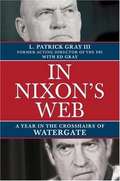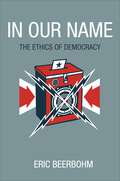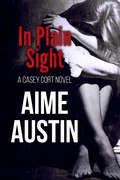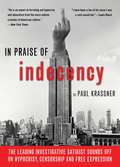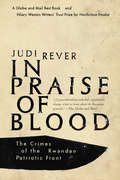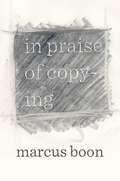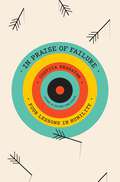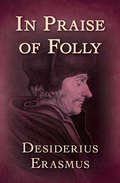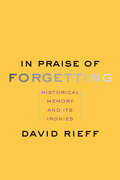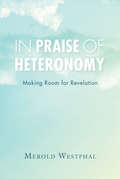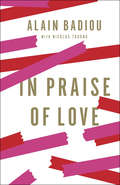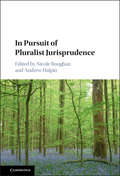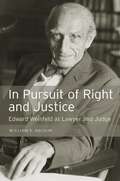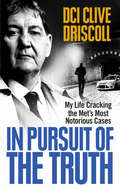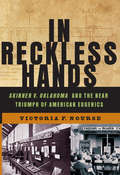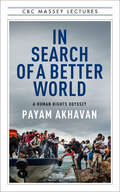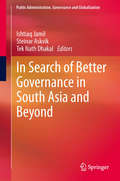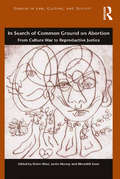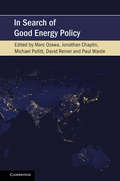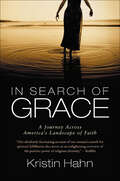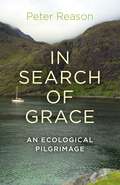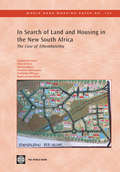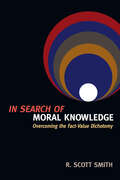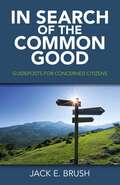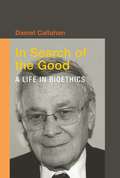- Table View
- List View
In Nixon's Web: A Year in the Crosshairs of Watergate
by L. Patrick Gray Ed GrayThe last untold story of Watergate "by the FBI director who maintained his silence for more than thirty years. L. Patrick Gray III was the man caught in the middle of the Watergate scandal.
In Our Name: The Ethics of Democracy
by Eric BeerbohmWhen a government in a democracy acts in our name, are we, as citizens, responsible for those acts? What if the government commits a moral crime? The protestor's slogan--"Not in our name!"--testifies to the need to separate ourselves from the wrongs of our leaders. Yet the idea that individual citizens might bear a special responsibility for political wrongdoing is deeply puzzling for ordinary morality and leading theories of democracy. In Our Name explains how citizens may be morally exposed to the failures of their representatives and state institutions, and how complicity is the professional hazard of democratic citizenship. Confronting the ethical challenges that citizens are faced with in a self-governing democracy, Eric Beerbohm proposes institutional remedies for dealing with them. Beerbohm questions prevailing theories of democracy for failing to account for our dual position as both citizens and subjects. Showing that the obligation to participate in the democratic process is even greater when we risk serving as accomplices to wrongdoing, Beerbohm argues for a distinctive division of labor between citizens and their representatives that charges lawmakers with the responsibility of incorporating their constituents' moral principles into their reasoning about policy. Grappling with the practical issues of democratic decision making, In Our Name engages with political science, law, and psychology to envision mechanisms for citizens seeking to avoid democratic complicity.
In Plain Sight (A Casey Cort Novel #3)
by Sylvie FoxStruggling to pull together the pieces of her life after another falling out with Ohio's most powerful political dynasty, Casey Cort turns her attention toward her budding relationship with rising assistant U.S. Attorney Miles Siegel. Things come to an abrupt halt when circumstances catapult them onto the scene of a horrific crime. Miles investigates the identity of an unlikely criminal mastermind, known on the street as Sledge Hammer. Meanwhile Casey discovers she may hold the key to solve the crime--and to the freedom of innocent women and children in the sex trafficking ring. Can Miles and Casey put the clues together to solve the mystery before the trail runs cold? In this continuation of the Casey Cort series, Sylvie Fox--a former trial lawyer in Cleveland--weaves a tale that blends the best of today's top legal thrillers with the heart and soul of women's fiction, in a story ripped from real-world headlines.
In Praise Of Indecency: The Leading Investigative Satirist Sounds Off on Hypocrisy, Censorship and Free Expression
by Paul KrassnerPaul Krassner's style of personal journalism constantly blurs the line between observer and participant. Nowhere is this more apparent than this collection of essays and interviews culled from his columns at AVN Online. Whether being interviewed by Susie Bright, or imagining a conversation between Pee-Wee Herman and Pete Townshend about their busts by overzealous cops, or reminiscing about his friend Lenny Bruce, Krassner shines his keen satirical mind on the so-called taboos of today’s society and breaks them down to show the hypocrisy of the world’s "culture warriors." With a biting wit and tongue firmly planted in cheek, Mr. Krassner reveals the absurdity of our oppressive social mores in this stark, funny, and ultimately thought-provoking collection.
In Praise of Blood: The Crimes Of The Rwandan Patriotic Front
by Judi ReverA stunning work of investigative reporting by a Canadian journalist who has risked her own life to bring us a deeply disturbing history of the Rwandan genocide that takes the true measure of Rwandan head of state Paul Kagame.Through unparalleled interviews with RPF defectors, former soldiers and atrocity survivors, supported by documents leaked from a UN court, Judi Rever brings us the complete history of the Rwandan genocide. Considered by the international community to be the saviours who ended the Hutu slaughter of innocent Tutsis, Kagame and his rebel forces were also killing, in quiet and in the dark, as ruthlessly as the Hutu genocidaire were killing in daylight. The reason why the larger world community hasn't recognized this truth? Kagame and his top commanders effectively covered their tracks and, post-genocide, rallied world guilt and played the heroes in order to attract funds to rebuild Rwanda and to maintain and extend the Tutsi sphere of influence in the region. Judi Rever, who has followed the story since 1997, has marshalled irrefutable evidence to show that Kagame's own troops shot down the presidential plane on April 6, 1994--the act that put the match to the genocidal flame. And she proves, without a shadow of doubt, that as Kagame and his forces slowly advanced on the capital of Kigali, they were ethnically cleansing the country of Hutu men, women and children in order that returning Tutsi settlers, displaced since the early '60s, would have homes and land. This book is heartbreaking, chilling and necessary.
In Praise of Copying
by Marcus BoonThis book is devoted to a deceptively simple but original argument: that copying is an essential part of being human, that the ability to copy is worthy of celebration, and that, without recognizing how integral copying is to being human, we cannot understand ourselves or the world we live in. In spite of the laws, stigmas, and anxieties attached to it, the word “copying” permeates contemporary culture, shaping discourse on issues from hip hop to digitization to gender reassignment, and is particularly crucial in legal debates concerning intellectual property and copyright. Yet as a philosophical concept, copying remains poorly understood. Working comparatively across cultures and times, Marcus Boon undertakes an examination of what this word means—historically, culturally, philosophically—and why it fills us with fear and fascination. He argues that the dominant legal-political structures that define copying today obscure much broader processes of imitation that have constituted human communities for ages and continue to shape various subcultures today. Drawing on contemporary art, music and film, the history of aesthetics, critical theory, and Buddhist philosophy and practice, In Praise of Copying seeks to show how and why copying works, what the sources of its power are, and the political stakes of renegotiating the way we value copying in the age of globalization.
In Praise of Failure: Four Lessons in Humility
by Costica BradatanSquarely challenging a culture obsessed with success, an acclaimed philosopher argues that failure is vital to a life well lived, curing us of arrogance and self-deception and engendering humility instead.Our obsession with success is hard to overlook. Everywhere we compete, rank, and measure. Yet this relentless drive to be the best blinds us to something vitally important: the need to be humble in the face of life’s challenges. Costica Bradatan mounts his case for failure through the stories of four historical figures who led lives of impact and meaning—and assiduously courted failure. Their struggles show that engaging with our limitations can be not just therapeutic but transformative.In Praise of Failure explores several arenas of failure, from the social and political to the spiritual and biological. It begins by examining the defiant choices of the French mystic Simone Weil, who, in sympathy with exploited workers, took up factory jobs that her frail body could not sustain. From there we turn to Mahatma Gandhi, whose punishing quest for purity drove him to ever more extreme acts of self-abnegation. Next we meet the self-styled loser E. M. Cioran, who deliberately turned his back on social acceptability, and Yukio Mishima, who reveled in a distinctly Japanese preoccupation with the noble failure, before looking to Seneca to tease out the ingredients of a good life.Gleefully breaching the boundaries between argument and storytelling, scholarship and spiritual quest, Bradatan concludes that while success can make us shallow, our failures can lead us to humbler, more attentive, and better lived lives. We can do without success, but we are much poorer without the gifts of failure.
In Praise of Folly: With Illustrations After Hans Holbein, And A Portrait, Together With A Life Of Erasmus And His Epistle Addressed To Sir Thomas Mor
by Desiderius ErasmusThis sixteenth-century religious satire by a Renaissance critic and theologian is &“a masterpiece of humor and wise irony&” (Johan Huizinga, Dutch historian). At the onset of his hugely successful satire of medieval European society, Dutch scholar Desiderius Erasmus invokes the goddess Folly, daughter of Youth and Wealth, who was raised by Drunkenness and Ignorance. She&’s followed by idolatrous companions, including Self-love, Flattery, Pleasure, and Laziness. Through Folly&’s wry and humorous speech, Erasmus denounces the superstitions and nonsensical eccentricities of his contemporary theologians and churchmen, monastic life, and the condition of the Catholic Church. An immensely influential humanist text, In Praise of Folly helped lay the groundwork for the Protestant Reformation and marked a transitional time between medieval beliefs and modern ideals.
In Praise of Forgetting: Historical Memory and Its Ironies
by David RieffThe conventional wisdom about historical memory is summed up in George Santayana's celebrated phrase, "Those who cannot remember the past are condemned to repeat it. " Today, the consensus that it is moral to remember, immoral to forget, is nearly absolute. And yet is this right? David Rieff, an independent writer who has reported on bloody conflicts in Africa, the Balkans, and Central Asia, insists that things are not so simple. He poses hard questions about whether remembrance ever truly has, or indeed ever could, "inoculate" the present against repeating the crimes of the past. He argues that rubbing raw historical wounds--whether self-inflicted or imposed by outside forces--neither remedies injustice nor confers reconciliation. If he is right, then historical memory is not a moral imperative but rather a moral option--sometimes called for, sometimes not. Collective remembrance can be toxic. Sometimes, Rieff concludes, it may be more moral to forget. Ranging widely across some of the defining conflicts of modern times--the Irish Troubles and the Easter Uprising of 1916, the white settlement of Australia, the American Civil War, the Balkan wars, the Holocaust, and 9/11--Rieff presents a pellucid examination of the uses and abuses of historical memory. His contentious, brilliant, and elegant essay is an indispensable work of moral philosophy.
In Praise of Heteronomy: Making Room for Revelation
by Merold WestphalRecognizing the essential heteronomy of postmodern philosophy of religion, Merold Westphal argues against the assumption that human reason is universal, neutral, and devoid of presupposition. Instead, Westphal contends that any philosophy is a matter of faith and the philosophical encounter with theology arises from the very act of thinking. Relying on the work of Spinoza, Kant, and Hegel, Westphal discovers that their theologies render them mutually incompatible and their claims to be the voice of autonomous and universal reason look dubious. Westphal grapples with this plural nature of human thought in the philosophy of religion and he forwards the idea that any appeal to the divine must rest on a historical and phenomenological analysis.
In Praise of Love
by Alain Badiou Nicolas TruongThe renowned French philosopher&’s &“ode to love&’s power to unite in the face of eternity, and its optimism in the face of pain&” (Publishers Weekly). In a world rife with consumerism, where online dating promises risk-free romance and love is all too often seen as a mere variant of desire and hedonism, Alain Badiou believes that love is under threat. Taking to heart Rimbaud&’s famous line &“love needs reinventing,&” In Praise of Love is the celebrated French intellectual&’s passionate treatise in defense of love. For Badiou, love is an existential project, a constantly unfolding quest for truth. This quest begins with the chance encounter, an event that forever changes two individuals, challenging them &“to see the world from the point of view of two rather than one.&” This, Badiou believes, is love&’s most essential transforming power. Through thought-provoking dialogue edited from a conversation between Badiou and Truong, a vibrant cast of thinkers are invoked: Kierkegaard, Plato, de Beauvoir, Proust, and more, create a new narrative of love in the face of twenty-first-century modernity. Moving, zealous, and wise, Badiou&’s &“paean to the anticapitalist, antiessentialist, unifying power of love&” urges us not to fear it but to see it as a magnificent undertaking that compels us to explore others and to move away from an obsession with ourselves (Publishers Weekly). &“Finally, the cure for the pornographic, utilitarian exchange of favors to which love has been reduced in America. Alain Badiou is our philosopher of love.&” —Simon Critchley, author of The Faith of the Faithless
In Pursuit of Pluralist Jurisprudence
by Nicole Roughan Andrew HalpinThe pluralist turn in jurisprudence has led to a search for new ways of thinking about law. The relationships between state law and other legal orders such as international, customary, transnational or indigenous law are particularly significant in this development. Collecting together new work by leading scholars in the field, this volume considers the basic questions about what would be an appropriate theoretical response to this shift: wow precisely is it to be undertaken? Is it called for by developments in legal practice or are these adequately addressed by current legal theory? What normative challenges are raised, and what fresh promises might the pluralist turn hold? What distinctive insights can it offer for theorising about law? This book presents a rich variety of resources drawn from a number of theoretical approaches and demonstrates how they might be brought together to generate an increasingly important pluralist jurisprudence.
In Pursuit of Right and Justice: Edward Weinfeld as Lawyer and Judge
by William E NelsonIn Pursuit of Right and Justice chronicles the life of the United States District Court's Judge Edward Weinfeld, from his humble Lower East Side origins to his distinction as one of the nation's most respected federal judges. Judge Edward Weinfeld's personal growth and socio-economic mobility provides an excellent illustration of how Catholics and Jews descended from turn-of-the-century immigrants were assimilated into the mainstream of New York and American life during the course of the twentieth century. Weinfeld left a rich collection of personal papers that William E. Nelson examines, which depict the compromises and sacrifices Weinfeld had to make to attain professional advancement. Weinfeld's jurisprudence remained closely tied to his own personal values and to the historical contexts in which cases came to his court. Nelson aptly describes how Weinfeld strove to avoid making new law. He tried to make decisions on preexisting rules or bedrock legal principles; he achieved just results by searching for and finding facts that called those rules into play. Weinfeld's vision of justice was simultaneously a liberal one that enabled him to develop law that reflected societal change, and an apolitical one that did not rest on contested policy judgments.
In Pursuit of the Truth: My life cracking the Met’s most notorious cases (subject of the ITV series, Stephen)
by Clive DriscollThe true story behind the ITV series, StephenFormer Detective Chief Inspector Clive Driscoll is most famous for being the man who finally secured convictions for the murder of Stephen Lawrence, a case previously mired by claims of institutional racism and corruption. For Clive, it was the pinnacle of a 35-year career with the world's most famous police force, the Metropolitan Police Service.Clive's prodigious rise through the ranks of the Met saw him front some of the most high-profile units at Scotland Yard. He was put in charge of their policy for sexual offences, domestic violence, child protection and the paedophile unit before heading up the Racial and Violent Crime Task Force tackling their backlist of cold cases. From action-packed moments chasing down criminals to more tender occasions, like gaining the trust of a murder victim's family, to making crucial legal history, and unearthing huge national scandals, In Pursuit of the Truth is the definitive account of modern day policing, its successes and failings included, seen through the eyes of a man who has dedicated his life to making a difference. This is a book that every part of society can learn from.
In Reckless Hands: Skinner v. Oklahoma and the Near-Triumph of American Eugenics
by Victoria F. NourseThe disturbing, forgotten history of America's experiment with eugenics. In the 1920s and 1930s, thousands of men and women were sterilized at asylums and prisons across America. Believing that criminality and mental illness were inherited, state legislatures passed laws calling for the sterilization of "habitual criminals" and the "feebleminded." But in 1936, inmates at Oklahoma's McAlester prison refused to cooperate; a man named Jack Skinner was the first to come to trial. A colorful and heroic cast of characters--from the inmates themselves to their devoted, self-taught lawyer--would fight the case all the way to the U.S. Supreme Court. Only after Americans learned the extent of another large-scale eugenics project--in Nazi Germany--would the inmates triumph. Combining engrossing narrative with sharp legal analysis, Victoria F. Nourse explains the consequences of this landmark decision, still vital today--and reveals the stories of these forgotten men and women who fought for human dignity and the basic right to have a family.
In Search of A Better World: A Human Rights Odyssey (The CBC Massey Lectures)
by Payam AkhavanA work of memoir, history, and a call to action, the CBC Massey Lectures by internationally renowned UN prosecutor and scholar Payam Akhavan is a powerful and essential work on the major human rights struggles of our times.Renowned UN prosecutor and human rights scholar Payam Akhavan has encountered the grim realities of contemporary genocide throughout his life and career. He argues that deceptive utopias, political cynicism, and public apathy have given rise to major human rights abuses: from the religious persecution of Iranian Bahá’ís that shaped his personal life, to the horrors of ethnic cleansing in Yugoslavia, the genocide in Rwanda, and the rise of contemporary phenomena such as the Islamic State. But he also reflects on the inspiring resilience of the human spirit and the reality of our inextricable interdependence to liberate us, whether from hateful ideologies that deny the humanity of others or an empty consumerist culture that worships greed and self-indulgence.A timely, essential, and passionate work of memoir and history, In Search of a Better World is a tour de force by an internationally renowned human rights lawyer.
In Search of Better Governance in South Asia and Beyond
by Ishtiaq Jamil Tek Nath Dhakal Steinar AskvikThe pursuit for better governance has assumed center stage in developmental discourse as well as reform initiatives of all organizations working for the public welfare, and includes such issues as service delivery and responding to citizens' needs and demands. In the era of globalization, multilevel and new modes of governance are changing the traditional governance models of nation states, accelerated by technological innovation, rising citizen expectation, policy intervention from international and multilateral donor communities, and the hegemony of western ideology imposed on many developing nations. However, a universally accepted and agreed upon definition of 'governance' still remains elusive. There is no consensus or agreement as to what would be the nature and form of governance and public administration. The question that is raised: Is there a universal governance mechanism that fits in all contexts or governance mechanisms should be based on home grown ideas?One can see various programs and policies of reforms and reorganizations in public administration in the developing countries, but these efforts have not been effective to address the challenging issues of economic development, employment generation, poverty reduction, ensuring equality of access to public services, maintaining fairness and equity, security and safety of citizens, social cohesion, democratic institution building, ensuring broader participation in the decision making process, and improving the quality of life. Therefore, there is a widespread concern for better governance or sound governance to bridge the gap between theory and practice, making this book of interest to academics as well as policy-makers in global public administration.
In Search of Common Ground on Abortion: From Culture War to Reproductive Justice (Gender in Law, Culture, and Society)
by Robin West Justin Murray Meredith EsserThis book brings together academics, legal practitioners and activists with a wide range of pro-choice, pro-life and other views to explore the possibilities for cultural, philosophical, moral and political common ground on the subjects of abortion and reproductive justice more generally. It aims to rethink polarized positions on sexuality, morality, religion and law, in relation to abortion, as a way of laying the groundwork for productive and collaborative dialogue. Edited by a leading figure on gender issues and emerging voices in the quest for reproductive justice - a broad concept that encompasses the interests of men, women and children alike - the contributions both search for 'common ground' between opposing positions in our struggles around abortion, and seek to bring balance to these contentious debates. The book will be valuable to anyone interested in law and society, gender and religious studies and philosophy and theory of law.
In Search of Good Energy Policy (Cambridge Studies on Environment, Energy and Natural Resources Governance)
by Paul Warde Jonathan Chaplin Marc Ozawa Michael Pollitt David ReinerDrawing on political science, economics, philosophy, theology, social anthropology, history, management studies, law, and other subject areas, In Search of Good Energy Policy brings together leading academics from across the social sciences and humanities to offer an innovative look at why science and technology, and the type of quantification they champion, cannot alone meet the needs of energy policy making in the future. Featuring world-class researchers from the University of Cambridge and other leading universities around the world, this innovative book presents an interdisciplinary dialogue in which scientists and practitioners reach across institutional divides to offer their perspectives on the relevance of multi-disciplinary research for 'real world' application. This work should be read by anyone interested in understanding how multidisciplinary research and collaboration is essential to crafting good energy policy.
In Search of Grace: A Journey Across America's Landscape of Faith
by Kristin HahnAfter years as a Hollywood writer and filmmaker, Kristin Hahn felt a crisis of faith: she had no spiritual group she could call her own. Setting out on a three-year journey, she began an investigation of America's religious traditions, practices, and beliefs.Crisscrossing the nation, Hahn spent a week cloistered in prayer with convent nuns and a month of Ramadan fasting with Muslims. She went door-to-door with young Mormon missionaries and head-to-head with turbaned Sikh yogis. She sat through marathon meditations with Buddhist masters and spent days in conversation and ceremony with an 0jibwe medicine man. Her explorations exposed her to the rich, ancient culture of the Jews and brought her into the enclaves of Christian Scientists and Amish farmers, as well as the less traditional realms of Scientology, neopagan witchcraft, and the congregations of new-age gurus.And this was only the beginning.Openhearted, humorous, and always thoughtful, In Search of Grace offers nourishment for our spiritual hunger -- and a myriad of ways to find a religious home.
In Search of Grace: An Ecological Pilgrimage
by Peter ReasonTo recover from ecological disaster, we humans must transform the sense of who we are in relation to the Earth. In Search of Grace is the story of an ecological pilgrimage undertaken by the author in his small yacht, Coral, from the south of England and round the west coast of Ireland, to the far north of Scotland. It explores themes of pilgrimage: the overall pattern of separation from the everyday, venturing forth, and returning home. It tells of meeting wildlife, visiting sacred places, confronting danger, expanding and deepening the experience of time, of silence and of fragility.
In Search of Land and Housing in the New South Africa: The Case of Ethembalethu
by Stephen Berrisford Ntombini Marrengane Zimkhitha Mhlanga Michael Kihato Rogier van den Brink Dave DegrootThis study outlines the difficulties poor communities face in accessing peri-urban land in South Africa that could have implications and lessons for similar communities in other countries facing spatial segregation issues. 'In Search of Land and Housing in the New South Africa' focused on one community, composed largely of laid-off farm workers that wanted to buy their own farm in a peri-urban area west of Johannesburg. Their dream was to establish a mixed-use settlement. They wanted to call the village Ethambalethu-'Our Hope.' About 250 families started their own association and savings scheme to make their dream a reality. By 1997, they had saved enough money to make their first purchase offer. A decade later, the community's dream is still not a reality. The families have faced numerous obstacles: two cancelled sale agreements, wrongful arrest, being sued in court, an out-of-court settlement for which community members were paid to not move into the white neighborhood, and large sums of their own money spent on consultants and environmental impact studies. In an agreement with the Mogale City Municipality, where the land is located, the community now has at least a confirmed right to occupy the land. But it does not yet legally own the land, and is still trying to get permission to build on and work the land. The case of Ethembalethu is not unique. Millions of black South Africans live in peri-urban areas. Yet, government programs, development planning and environmental regulations, and the current land and housing markets do not support realization of their aspirations to become homeowners on sites of their choice.
In Search of Moral Knowledge: Overcoming the Fact-Value Dichotomy
by R. Scott SmithFor most of the church's history, people have seen Christian ethics as normative and universally applicable. Recently, however, this view has been lost, thanks to naturalism and relativism. R. Scott Smith argues that Christians need to overcome Kant's fact-value dichotomy and recover the possibility of genuine moral and theological knowledge.
In Search of the Common Good: Guideposts for Concerned Citizens
by Jack E. BrushIn Search of the Common Good: Guideposts for Concerned Citizens is a sequel to the author&’s book Citizens of the Broken Compass: Ethical and Religious Disorientation in the Age of Technology. As the title indicates, the work is not addressed to an academic audience, but rather to a general readership, i.e. to concerned citizens who are interested in thinking through some of the ethical and moral issues facing us today. Still, the book is not a work on ethics or even on morality in the strict sense, but rather an attempt to locate certain guideposts for thinking about the common good in society. The basic theme of the entire book is this: Concern for the common good should be the context in which individual human rights are interpreted.
In Search of the Good
by Daniel CallahanDaniel Callahan helped invent the field of bioethics more than forty years ago when he decided to use his training in philosophy to grapple with ethical problems in biology and medicine. Disenchanted with academic philosophy because of its analytical bent and distance from the concerns of real life, Callahan found the ethical issues raised by the rapid medical advances of the 1960s--which included the birth control pill, heart transplants, and new capacities to keep very sick people alive--to be philosophical questions with immediate real-world relevance. In this memoir, Callahan describes his part in the founding of bioethics and traces his thinking on critical issues including embryonic stem cell research, market-driven health care, and medical rationing. He identifies the major challenges facing bioethics today and ruminates on its future. Callahan writes about founding the Hastings Center--the first bioethics research institution--with the author and psychiatrist Willard Gaylin in 1969, and recounts the challenges of running a think tank while keeping up a prolific flow of influential books and articles. Editor of the famous liberal Catholic magazine Commonweal in the 1960s, Callahan describes his now-secular approach to issues of illness and mortality. He questions the idea of endless medical "progress" and interventionist end-of-life care that seems to blur the boundary between living and dying. It is the role of bioethics, he argues, to be a loyal dissenter in the onward march of medical progress. The most important challenge for bioethics now is to help rethink the very goals of medicine.
